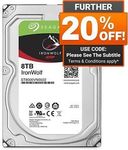Seagate IronWolf 8TB 3.5" 7200RPM 256MB Cache SATA Internal NAS Hard Drive HDD
20% off with code PRIZER. Ends 08/Dec
Optimised for NAS enclosures with AgileArray, enables dual-plane balancing and RAID optimisation in multi-bay environments.
Multi-User technology for increased user workload rate
24×7 always on, always accessible with NAS enclosures
Actively protect your NAS with IronWolf Health Management.
Rotational Vibration (RV) sensors.
1M hours MTBF, 3-year warranty.





Can anyone vouch for the reliability of these? I know WD reds are the gold standard.